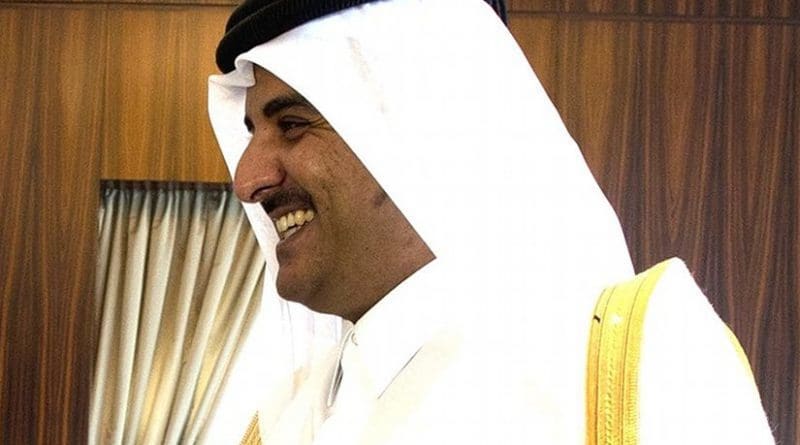Why Is UK Mediating The Gulf Dispute? – OpEd
By Samantha Maloof*
The following statement was made in Washington in response to the decision by Saudi Arabia, the UAE, Bahrain, and Egypt to cut ties with Qatar, which they accuse of funding terrorism: “Our expectation is that these countries will immediately take steps to de-escalate the situation and put forth a good faith effort to resolve their grievances they have with each other.”
This is the kind of nuanced, even-handed statement one would expect to hear from the president of a country that is an ally to all parties and shares a strategic interest in ensuring the peaceful resolution of the situation. However, these were not the words of the US president, but of Rex Tillerson, the Secretary of State. Normally, pronouncements made by the State Department and those made by the president on an issue like this would be interchangeable.
But in the “new normal” of the Trump administration, the president decided to undercut Tillerson’s evenhanded statement, blurting out support for the Saudis’ move and accusing Qatar of supporting terrorism on Twitter. It seems that Trump has conveniently forgotten the fact that Qatar had just signed a $12 billion weapon transfer deal with the United States. His outburst thus reinforces Trump’s own image as a loose cannon and his administration as one that has completely lost its ability to lead in the Middle East.
It’s hardly surprising, then, that on Monday, Qatar’s Foreign Minister Mohammed bin Abdulrahman Al-Thani flew to London and not Washington in search of a steadfast broker in the dispute. After UK Foreign Secretary Boris Johnson met with his Qatari counterpart, he issued an appropriately dispassionate statement calling on the Gulf states to ease the blockade and “all states to take immediate steps to de-escalate the situation and to find a rapid resolution through mediation.”
Because of both new and existing factors, it’s not surprising the UK has decided to act as the adult in the room. Britain has longstanding relations with the Gulf states, including both Saudi Arabia and Qatar, dating back to the days of the Persian Gulf Residency. But with Brexit hanging over its head, the UK needs outside trading partners – especially in the Gulf – more than ever. And this economic imperative might just be the clincher in getting the two parties to take a step back and de-escalate the situation.
It speaks volumes that just five days after Article 50 was triggered, Theresa May traveled to Riyadh to start laying the groundwork for a future free trade deal with the GCC. With her on the Saudi leg of the tour was Xavier Rolet, CEO of the London Stock Exchange, lobbying to handle part of the Saudi Aramco IPO. The sale of a 5% stake in the national oil behemoth is expected to be worth upwards of $100 billion. If London can get a slice of that, it will go a long way towards maintaining the city’s credentials as a global financial hub after it leaves the EU. More broadly, the rampant privatization of Saudi industry and services in an effort to diversify revenue sources opens up an Aladdin’s cave of pickings for British companies, with a slew of multi-billion dollar contracts coming up for tender over the next decade.
The fact that Brexit, and the necessity it creates for the UK to sign new trade deals, coincides with the roll out of Saudi Arabia’s Vision 2030 plan to secure more foreign investment, means the two countries have more incentive than ever to build upon their foundation of cooperation.
But while Saudi is the UK’s largest trading partner in the region, Qatar supplies 30% of Britain’s natural gas needs. What’s more, the list of British assets that Qatar owns or has invested in reads like a roll call of national icons: Harrods; Claridge’s Hotel; the Olympic village; not to mention the Shard, London’s tallest building. And it’s not only iconic pieces of real estate that rank among the recipients of Qatari largesse. After the economic crash of 2008, Doha stepped in to bail out Barclays bank, saving it from nationalization. All in all, Qatar has already invested $50.1 billion in the UK and has committed to investing another $6.23 billion in the run-up to Brexit.
Given the economic context, then, as well as wider concerns about stability in the Middle East, it’s no surprise that Britain is stepping in to try to calm the dispute. And in a sense, the government has already made a nod to its growing burden of responsibilities in the Gulf. Last month, a committee of UK lawmakers published a new report saying that Britain could no longer rely on US leadership in the Middle East. At the time, there was no signal of the impending Gulf dispute. But the latest string of events might just force the UK to take up the mantle of the mature Western partner perhaps much sooner than expected.
About the author:
*Samantha Maloof is a freshly minted graduate in International Relations based in Cairo, currently working as a research assistant in a small think tank looking at development and inequality in Africa.
Source:
This article was published by Modern Diplomacy

